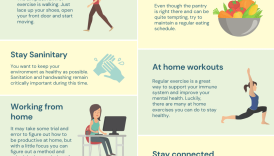Designing Your Best Life: A Blueprint for a Healthy Lifestyle

Understanding the Importance of a Healthy Lifestyle
Adopting a healthy lifestyle is not merely a trend; it’s a fundamental key to longevity and quality of life. People are increasingly recognizing that the choices they make daily have lasting impacts on their physical, mental, and emotional well-being. The importance of a healthy lifestyle can be broken down into several elements:
- Designing Your Best Life: A Blueprint for a Healthy Lifestyle
- Understanding the Importance of a Healthy Lifestyle
- Setting Goals for Your Well-Being
- Nutrition and Diet
- Creating a Balanced Meal Plan
- Tips for Healthy Eating Habits
- Exercise and Fitness
- Designing a Personalized Workout Routine
- Incorporating Physical Activity into Your Daily Life
- Mental Health and Stress Management
- Practicing Mindfulness and Relaxation Techniques
- Building Resilience and Coping Strategies
- Sleep Hygiene
- Establishing a Consistent Sleep Schedule
- Creating a Relaxing Bedtime Routine
- Social Connections and Relationships
- Nurturing Meaningful Connections
- Setting Boundaries for Healthy Relationships
- Self-Care Practices
- Identifying Activities that Bring You Joy
- Prioritizing Self-Care in Your Daily Routine
- Physical Health: Regular exercise and a balanced diet contribute to a strong immune system and lower disease risk.
- Mental Clarity: Good nutrition and physical activity can enhance cognitive functions, leading to improved focus and productivity.
- Emotional Balance: Engaging in self-care and managing stress effectively fosters resilience and a positive outlook toward life.
Setting Goals for Your Well-Being
To embark on this journey towards a healthier lifestyle, setting clear, attainable goals is essential. Goals provide direction and motivation, transforming vague desires into actionable plans. Here’s how to establish effective objectives:
- Be Specific: Instead of saying, “I want to eat better,” specify, “I will incorporate two servings of vegetables into my lunch each day.”
- Make It Measurable: Track your progress. For example, “I will walk 30 minutes five times a week.”
- Set Achievable Goals: Ensure your goals are realistic to avoid unnecessary frustration.
- Time-Bound: Establish deadlines to boost your commitment. For instance, “I will achieve this in three months.”
By understanding the importance of these choices and setting realistic goals, anyone can pave the way to a healthier, more fulfilling life.
Nutrition and Diet
Creating a Balanced Meal Plan
Transitioning to a healthier lifestyle naturally brings nutrition and diet to the forefront. A balanced meal plan is essential for fueling the body and maintaining energy levels throughout the day. To create an effective meal plan, consider the following steps:
- Diverse Food Groups: Include a variety of food groups in your daily intake:
- Fruits and Vegetables: Aim for at least five servings a day. These are rich in vitamins, minerals, and fiber.
- Whole Grains: Incorporate brown rice, quinoa, and whole wheat products to enhance nutrient intake.
- Proteins: Rotate between lean meats, fish, beans, and dairy to get a mix of essential amino acids.
- Portion Control: Use smaller plates to help control your portions visually.
- Meal Prep: Spend a few hours on weekends planning and preparing meals, ensuring you have healthy options readily available.
Tips for Healthy Eating Habits
To complement a balanced meal plan, adopting healthy eating habits is crucial. Here are some actionable tips:
- Stay Hydrated: Drink at least 8 glasses of water a day. Sometimes, our body confuses thirst with hunger.
- Mindful Eating: Slow down and enjoy your meals. This allows your body to signal when it’s full.
- Limit Processed Foods: Choose whole foods whenever possible; they offer greater nutritional benefits.
Remember, small changes can lead to significant benefits over time. Integrating these habits will not only enhance your meal planning but also contribute to overall wellness.
Exercise and Fitness
Designing a Personalized Workout Routine
Building upon a balanced diet, exercise plays a vital role in supporting a healthy lifestyle. When designing a personalized workout routine, it’s important to consider your fitness level, preferences, and goals. Here are some key steps to craft an effective routine:
- Assess Your Fitness Level: Determine where you stand by evaluating your stamina, strength, and flexibility. This can be done through simple exercises like push-ups or squats.
- Define Your Goals: Are you aiming to lose weight, build muscle, or improve endurance? Setting specific goals helps tailor your routine more effectively.
- Choose Varied Activities: Include a mix of:
- Cardio: Activities like running, cycling, or swimming raise your heart rate and improve cardiovascular health.
- Strength Training: Incorporate bodyweight exercises (like squats or lunges) or use weights to build muscle.
- Flexibility and Balance: Don’t forget stretching or yoga to enhance flexibility and prevent injury.
- Be Consistent: Aim for at least 150 minutes of moderate aerobic activity each week, including two days of strength training.
Incorporating Physical Activity into Your Daily Life
Designing a workout plan is just one part of the equation. To fully embrace a healthy lifestyle, incorporating physical activity into your daily routine is essential. Here are some fun ways to do this:
- Take the Stairs: Opt for stairs instead of elevators whenever possible.
- Walking Meetings: If you have a work-related call or discussion, suggest a walk instead.
- Active Hobbies: Engage in activities like dancing, gardening, or sports that you enjoy.
Every little bit counts. By making these small changes, you’ll not only enhance your fitness routine but also cultivate a more active and healthy lifestyle overall.
Mental Health and Stress Management
Practicing Mindfulness and Relaxation Techniques
As one integrates exercise and nutrition into their life, mental health and stress management become equally crucial. Our daily hustle and bustle can overwhelm even the most organized person, making mindfulness and relaxation techniques essential tools for coping. Mindfulness encourages living in the moment and appreciating the here and now. Here are a few effective practices:
- Deep Breathing Exercises: Spend a few minutes each day focusing solely on your breath. Inhale deeply through your nose and exhale through your mouth, letting tension melt away.
- Meditation: Consider starting with just five minutes per day, using guided apps or videos. Over time, gradually increase the duration.
- Journaling: Write down your thoughts and feelings, helping to clear mental clutter and process emotions.
In my own experience, committing to just five minutes of deep breathing each morning significantly improved my focus throughout the day.
Building Resilience and Coping Strategies
Alongside mindfulness, building resilience is key to navigating life’s challenges. Resilience is the ability to bounce back from adversity and can be cultivated with practice. Here are some strategies:
- Positive Thinking: Replace negative thoughts with positive affirmations. For instance, instead of saying, “I can’t handle this,” switch to, “I will do my best.”
- Social Support: Surrounding yourself with a solid support network can provide comfort and perspective during tough times.
- Healthy Coping Mechanisms: Engage in hobbies, exercise, or connect with friends rather than resorting to unhealthy habits like excessive screen time or junk food.
By integrating these mindfulness practices and resilience-building strategies into daily life, one can significantly improve mental well-being, creating a more balanced and fulfilling lifestyle.
Sleep Hygiene
Establishing a Consistent Sleep Schedule
Transitioning from mental health and stress management to sleep hygiene is a natural step in creating a holistic approach to well-being. Adequate sleep is foundational for mental clarity, emotional stability, and overall health. Establishing a consistent sleep schedule is a crucial part of good sleep hygiene. Here are some steps to achieve that:
- Set Fixed Sleep and Wake Times: Go to bed and wake up at the same time every day, even on weekends. This consistency helps regulate your body’s internal clock.
- Avoid Long Naps: If needed, keep naps to 20-30 minutes in the early afternoon to avoid disrupting nighttime sleep.
- Limit Stimulants: Avoid caffeine and nicotine several hours before bedtime, as they can interfere with falling asleep.
In my own life, committing to a regular sleep schedule has made a noticeable difference in my energy levels throughout the day.
Creating a Relaxing Bedtime Routine
Once you have a consistent sleep schedule in place, crafting a relaxing bedtime routine can signal your body that it’s time to wind down. Here are some tips to create the perfect pre-sleep ritual:
- Dim the Lights: Lowering light levels can help cue your brain that it’s time for rest.
- Unplug from Devices: Avoid screens at least an hour before bed. The blue light emitted can interfere with melatonin production.
- Engage in Soothing Activities: Consider reading a book, practicing gentle yoga, or enjoying calming herbal tea.
Remember, the goal is to create a peaceful environment that promotes relaxation. By establishing a consistent sleep schedule and a soothing bedtime routine, one can greatly enhance their overall sleep quality, providing a refreshing foundation for a productive day ahead.
Social Connections and Relationships
Nurturing Meaningful Connections
As individuals cultivate good sleep hygiene, it’s crucial to recognize the impact of social connections on overall well-being. Relationships play a significant role in our happiness and can be a source of support during challenging times. Nurturing meaningful connections can lead to a richer, more fulfilling life. Here are some ways to strengthen those bonds:
- Prioritize Quality Time: Schedule regular catch-ups with friends or family—whether it’s a weekend brunch or a game night. Making time for loved ones fosters deeper connections.
- Express Gratitude: Sharing appreciation not only strengthens relationships but also enhances your own emotional well-being. A simple “thank you” can go a long way.
- Be Present: Put away distractions when spending time with others. Actively listen and engage in conversations to create a supportive environment.
Personally, setting aside a monthly dinner with close friends has significantly boosted my mood and sense of community.
Setting Boundaries for Healthy Relationships
While nurturing relationships is essential, understanding and establishing boundaries is equally important for maintaining emotional health. Healthy boundaries help define acceptable behaviors, ensuring mutual respect and understanding. Consider these strategies:
- Communicate Clearly: Express your needs and limits openly. For instance, if you need time for self-care, let your friends know.
- Learn to Say No: It’s okay to decline invitations or requests that drain your energy or conflict with your priorities.
- Recognize Red Flags: Be aware of relationships that consistently make you feel stressed or undervalued.
By nurturing meaningful connections while also setting clear boundaries, individuals create a balanced social life that promotes well-being and fulfillment.
Self-Care Practices
Identifying Activities that Bring You Joy
Building off the importance of healthy relationships, embracing self-care practices is essential for maintaining emotional and mental well-being. One of the first steps in self-care is identifying activities that truly bring joy and fulfillment. These activities ignite passion and rejuvenate the spirit. Consider exploring your interests through these ideas:
- Reflect on Hobbies: Think about what you enjoyed doing as a child or what you’ve always wanted to try, whether it’s painting, gardening, or playing a musical instrument.
- Explore New Experiences: Attend workshops, classes, or community events to discover new passions. You may find joy in activities you never expected!
- Connect with Nature: Spending time outdoors, whether hiking a trail or simply walking in the park, can significantly lift your mood.
For instance, I recently took up pottery, and the therapeutic benefits of molding clay have brought immense joy and relaxation into my life.
Prioritizing Self-Care in Your Daily Routine
Once you’ve identified your joyful activities, it’s time to prioritize self-care in your daily routine. Making time for self-care ensures that you recharge and maintain balance. Here are some practical tips:
- Schedule “Me Time”: Just like any important appointment, block out time in your calendar dedicated strictly to self-care activities.
- Create a Morning Ritual: Start the day with activities that set a positive tone, whether it’s meditation, journaling, or enjoying a warm cup of tea.
- Establish Evening Wind-Downs: As part of your bedtime routine, consider incorporating relaxation practices that help transition you into a restful state.
By consistently integrating these activities into daily life, individuals enhance their overall happiness and resilience, allowing for a more balanced and fulfilling life journey.





